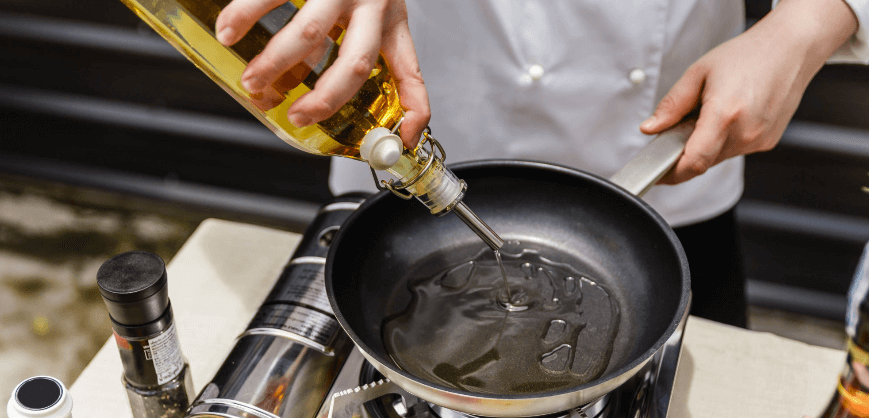Does olive oil ruin non-stick pans?

It’s a common question in the kitchen: does olive oil ruin non-stick pans? The answer is both yes and no. Yes, if you cook with olive oil on a high heat, it can damage the non-stick coating on your pan.
However, if you use olive oil on a lower heat, it won’t cause any damage. In fact, many people prefer to cook with olive oil because it has a higher smoke point than other oils. So if you’re looking to use olive oil in your cooking, just be sure to use it at a lower temperature.
If you’re like me, you love cooking with olive oil. It’s healthy, it tastes great, and it makes food just taste better. But if you’re also like me, you’ve probably ruined a few non-stick pans in the process.
It’s not that olive oil is necessarily bad for non-stick pans, but it can definitely cause some problems. The main issue is that olive oil has a lower smoke point than other oils, which means that it can start to smoke and burn at lower temperatures. This can cause the coating on your pan to break down and eventually peel off.
So what can you do to avoid ruining your non-stick pan with olive oil? The best solution is to use a pan that has a higher smoke point, like stainless steel or cast iron. If you really want to use olive oil, make sure to heat the pan up slowly and carefully so that the oil doesn’t have a chance to smoke and damage the coating.
Best Oil for Non Stick Pans
If you’re looking for the best oil to use in your non-stick pans, you’ve come to the right place. We’ll give you all the information you need to know about what oils are best for non-stick pans, so that you can make an informed decision about which one to use in your own kitchen. There are a few different types of oil that can be used in non-stick pans, and each has its own advantages and disadvantages.
The most popular type of oil to use in non-stick pans is vegetable oil, because it’s relatively inexpensive and easy to find. However, vegetable oil can be a smoking point, which means that it can start to break down at high temperatures and release harmful chemicals into the air.
If you’re concerned about this, you may want to consider using another type of oil such as olive oil or coconut oil, which have higher smoking points and are therefore less likely to release harmful chemicals into the air when heated.
Another factor to consider when choosing an oil for your non-stick pan is its flavor. Some oils, like olive oil, have a strong flavor that some people might not enjoy. If you’re using your pan for cooking rather than just frying, you might want to choose an unflavored oil so that it doesn’t affect the taste of your food.
Finally, you should also consider how often you’ll be using your pan before deciding on an oil. If you only use your pan occasionally, any type of oil will do; but if you use it frequently,you might want to pick an oil with a higher smoke point so that it lasts longer without needing to be replaced as often .
Can You Use Olive Oil Instead of Non-Stick Spray?
Sure, you can use olive oil instead of non-stick spray. In fact, many people prefer to cook with olive oil because it is a healthy alternative to other oils and fats. Plus, it has a nice flavor that can enhance the taste of your food.
However, there are a few things you should keep in mind when cooking with olive oil. First, it has a lower smoke point than other oils, so it is best to use it for low or moderate heat cooking. Second, it can be messy if you’re not careful.
Be sure to pour the oil into a measuring cup or spouted container before adding it to your pan so you don’t end up with a greasy mess. Lastly, because olive oil is a natural product, it can vary in quality from one brand to another. So, be sure to buy a good quality olive oil that you like the taste of.
Olive Oil Non Stick Spray
If you’re looking for a healthy alternative to traditional non-stick cooking spray, olive oil spray is a great option. Unlike most commercial non-stick sprays, olive oil spray doesn’t contain any harmful chemicals or artificial ingredients. It’s also very easy to make at home with just a few simple ingredients.
To make your own olive oil spray, simply combine 1 part olive oil with 2 parts water in a small bottle or container. Shake well to blend the ingredients and then mist onto your cookware as needed. The olive oil will help to prevent sticking and make cleanup a breeze.
If you don’t have any olive oil on hand, another option is to use vegetable oil or coconut oil. These oils also work well as non-stick sprays and can be used in the same way as the olive oil spray recipe above.
Best Cooking Spray for Non Stick Pans
If you have ever cooked with a non-stick pan, then you know how important it is to use the right cooking spray. There are many different brands and types of cooking spray on the market, so how do you know which one is best for your non-stick pan? The best way to find out is by doing some research.
Read online reviews and compare products to find the best cooking spray for your needs. When you are looking at different products, pay attention to the ingredients list. You want to make sure that the product you choose does not contain any harmful chemicals or additives.
Once you have found a few different options, buy a small bottle of each and test them out in your own kitchen. See which one works best for you and your family. Remember, what works for one person may not work for another, so don’t be afraid to experiment until you find the perfect cooking spray for your non-stick pan!
Do Salt Scratch Non Stick Pans?
If you’re like most people, you probably have a love-hate relationship with your nonstick cookware. On one hand, it’s great for cooking up quick and easy meals with little to no cleanup required. But on the other hand, it seems like every time you turn around there’s another story about how dangerous nonstick cookware can be.
So what’s the truth? Is nonstick cookware really safe to use? One of the biggest concerns about nonstick cookware is that it might release harmful chemicals into food when heated.
However, according to the U.S. Environmental Protection Agency (EPA), this is not a health concern as long as the pan is used properly. The EPA recommends using only low or moderate heat when cooking with nonstick pans, as high temperatures can cause the coating to break down and release toxins into food. Another concern is that scratching or chipping of the nonstick coating can also lead to toxin release.
However, this is only an issue if the scratched area is large enough to allow food contact. If you do happen to scratch your pan, throw it out and get a new one – it’s not worth taking any chances! So what about salt?
Can adding salt to food cooked in a nonstick pan cause scratches? The answer is yes – but only if you use too much salt. Salt can be abrasive and if you add too much of it to your pan, it can cause scratches in the coating.
To avoid this, simply use less salt or switch to another type of seasoning such as pepper or herbs.
Can You Use Olive Oil in Ceramic Pans?
If you’re a fan of cooking with olive oil, you may be wondering if it’s safe to use in your ceramic pans. The short answer is yes, you can definitely use olive oil in ceramic pans! Here’s a closer look at why this cooking oil is such a good choice for ceramic cookware:
Olive oil is very versatile. It can be used for sautéing, frying, and even baking. Plus, it has a high smoke point, so it won’t burn easily like other oils.
Ceramic pans are non-stick and easy to clean. They also heat up evenly, which helps prevent hot spots that can cause food to stick or burn. Olive oil has many health benefits.
It’s packed with antioxidants and healthy fats that can help improve your cholesterol levels and reduce your risk of heart disease. Plus, it’s a great source of vitamins E and K. So there you have it – there are plenty of reasons to use olive oil in your ceramic pans!
Give it a try the next time you’re cooking up a meal and see for yourself how delicious and healthy it can be.
Does Vinegar Ruin Non Stick Pans?
If you’re like most people, you probably have a bottle of vinegar in your kitchen. And, you may have wondered if it’s safe to use on your non-stick cookware. The answer is: yes and no.
Vinegar can be used to clean your non-stick pans, but it’s important to dilute it with water. Otherwise, the acidity in the vinegar can damage the coating on your pans. To clean your pan, simply mix equal parts vinegar and water in a bowl.
Then, use a sponge or cloth to wipe down the inside of your pan. Rinse with warm water and dry with a towel. If your pan is particularly dirty, you may need to let the vinegar solution sit on the surface for a few minutes before wiping it away.
But be sure to rinse well afterwards so that none of the vinegar remains on the pan. So there you have it! Vinegar can be used to clean your non-stick cookware safely – just be sure to dilute it first!
What Not to Do With Non Stick Pans?
If you’ve ever used a non-stick pan, you know how convenient they can be. But did you know that there are some things you should never do with your non-stick pan? Here’s a list of the top 5 things not to do with your non stick pan:
- Don’t use metal utensils – Metal utensils can scratch the surface of your non-stick pan and cause it to break down over time. Stick to using wooden or plastic utensils instead.
- Don’t cook over high heat – High heat can also damage the surface of your pan and cause it to break down. So when cooking with a non-stick pan, make sure to keep the heat on low or medium.
- Don’t put in the dishwasher – The harsh detergents in dishwashing soap can also damage the surface of your pan. To clean your non-stick pan, simply wash it by hand with warm soapy water.
- Don’t store food in it – If you’re not using your pan, make sure to empty it out and wash it before storing away. Storing food in your non-stick pan can lead to bacteria growth and contamination.
- Don’t forget about proper care – In order for your non-stick pans to last, you need to take good care of them!
Make sure to always follow the manufacturer’s instructions on how best to clean and maintain your pans.
Can You Use Olive Oil on a Nonstick Pan?
If you’re like most people, you probably have a go-to cooking oil that you use for just about everything. But what happens when you need to cook with a nonstick pan? Does olive oil ruin non-stick pans?
Here’s what you need to know about using olive oil on a nonstick pan: First, it’s important to understand that not all olive oils are created equal. Extra virgin olive oil has a lower smoke point than other types of olive oil, so it’s not the best choice for cooking at high temperatures.
If you do use extra virgin olive oil on a nonstick pan, be sure to heat the pan before adding the oil. This will help prevent the oil from smoking and breaking down the nonstick coating on your pan. Second, remember that a little bit of olive oil goes a long way.
When cooking with a nonstick pan, you don’t need to douse the entire surface in oil – just add enough to coat the bottom of the pan and prevent sticking. Too much oil can actually make food stickier, so be sparing with your pour. Finally, don’t forget that proper care and cleaning is essential for prolonging the life of your nonstick pans – no matter what type of cooking surface they have.
Be sure to wash them thoroughly after each use (avoiding harsh detergents), and always store them properly to prevent damage. With proper care, your nonstick pans should last for years!
What is the Best Oil to Use on a Non-Stick Pan?
If you’re looking for the best oil to use on a non-stick pan, you’ll want to choose an oil with a high smoke point. Smoke point is the temperature at which an oil begins to break down and release harmful chemicals. The higher the smoke point, the better.
Some good choices for high smoke point oils include avocado oil, grapeseed oil, and coconut oil. If you’re looking for a healthy option, avocado oil is a great choice. It’s also relatively inexpensive and easy to find in most grocery stores.
Grapeseed oil has a slightly higher smoke point than avocado oil, making it another good choice for cooking at high temperatures. Coconut oil is another option with a high smoke point, but it can be more expensive than other options. No matter which oil you choose, be sure to use it sparingly on your non-stick pan.
Too much oil can cause the pan to stick and make cleanup more difficult.
How do you measure the temperature of cooking oil?
Does Oil Ruin Non-Stick Pans?
If you’ve ever cooked with oil, chances are you’ve noticed that it can be tough to clean up afterwards. Oil tends to stick to surfaces, making them difficult to clean and causing build-up over time. This is especially true for non-stick surfaces like Teflon or other coated pans.
So, does oil ruin non-stick pans? The short answer is yes, it can. Over time, the oil will break down the coating on the pan and cause it to lose its non-stick properties.
Additionally, the build-up of oil can make the pan more difficult to clean and more likely to smoke when heated. However, this doesn’t mean that you need to avoid using oil altogether. If you use it sparingly and make sure to clean your pan afterwards, you can still enjoy all the benefits of a non-stick surface.
Just be aware that repeated use will eventually lead to deterioration and be sure to replace your pan when necessary.
What Will Ruin a Non-Stick Pan?
It’s easy to take your non-stick pan for granted. After all, it’s there to make cooking easier and cleanup a breeze. But what you may not realize is that there are things you’re doing every day that are slowly but surely ruining your pan. Here are three things that will ruin a non-stick pan.
Using metal utensils – This is probably the number one way people ruin their non-stick pans. Metal utensils can scratch the surface of the pan, causing the non-stick coating to flake off and eventually rendering the pan useless. Stick to using wooden or plastic utensils when cooking with a non-stick pan.
Overheating the pan – Just like with metal utensils, overheating can also cause the non-stick coating on your pan to break down and flake off. It’s important to follow the manufacturer’s instructions when it comes to heating up your pan, as different brands have different temperature recommendations.
Not using enough oil – A lot of people think that because they have a non-stick pan, they don’t need to use any oil when cooking with it. This isn’t true! In fact, not using enough oil is one of the main reasons why food sticks to a non-stick pan in the first place.
Be sure to add enough oil (or whatever fat you’re using) so that your food doesn’t stick and tear when you try to flip it over.
Conclusion
If you’ve ever used olive oil to cook, chances are you’ve noticed that it can leave a sticky residue on your pans. While this may not seem like a big deal, it can actually ruin your non-stick cookware. The oils in olive oil can interact with the coating on your pan, causing it to break down and flake off.
This not only makes it harder to clean your pan, but also means that food will start to stick to it. If you want to avoid ruining your non-stick cookware, stick to using other types of oil or cooking spray.



Comments(0)